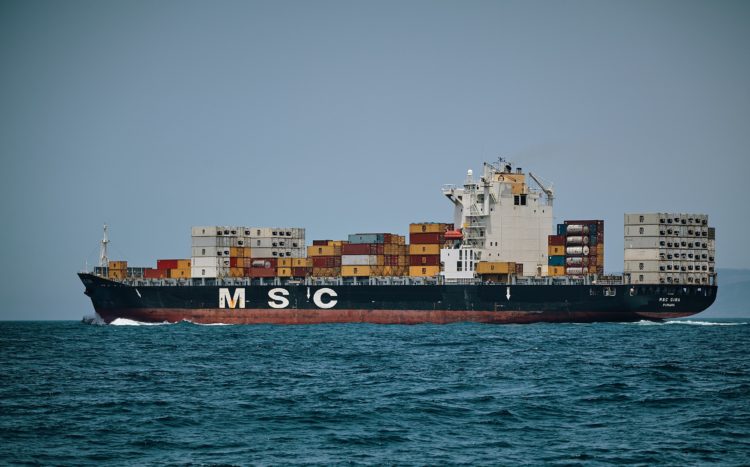China reported a record trade surplus with the United States despite the ongoing economic dispute between Beijing and Washington. According to a report from Agence France Presse (AFP), the excess is worth around $34.1 billion as of September.
Currently, China is exporting more than $46 billion worth of goods to the US, while only importing $12.6 billion.
The two superpowers traded blows earlier in the year, with both countries placing sanctions on each other. US President Donald Trump has been adamant about pressing China until the United States gets some satisfaction. Currently, the US is sanctioning $200 billion worth of Chinese goods — which includes everything from frozen foods to industrial equipment. In return, China placed retaliatory sanctions on $60 billion worth of US imports.
“China-US trade friction has caused trouble and pounded our foreign trade development,” said Chinese customs spokesman Li Kuiwen while speaking to the media on Friday.
Despite Kuiwen’s claims, the trade surplus between the two countries grew by around 10 percent between August and September. According to CNBC, China’s exports are up by close to 15 percent from this time last year, which is substantially more than the 8.9 percent increase that experts predicted.
However, while China is enjoying a period of relative prosperity, many experts expect the full pain of the US sanctions to hit Chinese markets in the coming months.
“With global growth likely to cool further in the coming quarters and US tariffs set to become more punishing, the recent resilience of exports is unlikely to be sustained,” said senior China economist at Capital Economics, Julian Evans-Pritchard while speaking to CNBC. “Meanwhile, with policy easing unlikely to put a floor beneath domestic economic activity until the middle of next year, import growth is set to slow further.”
Some experts believe the key to China’s economic future lies in its logistical capabilities. According to CNBC, economist Zhang Zhiwei of Deutsche Bank thinks the tariffs will have a “limited” effect on China’s economy and says that Beijing’s “focus now is to try to retain supply chains that support the rest of the world.”
China’s export rate has been rising since the beginning of the year; however, according to a report from Bloomberg, much of this is attributed to companies rushing to get their product out of the country before additional sanctions hit. President Trump has already threatened to place additional tariffs on $267 million worth of Chinese goods unless an agreement is reached, which is further incentive for retailers to get their existing orders out of Chinese factories, and possibly find alternate manufacturing sites.
“I think this was still subject to the front-loading effect ahead of the implementation of the $200 billion of tariffs,” said Australia and New Zealand Banking Group Ltd senior economist, Betty Wang, during an interview with Bloomberg.
Already have an account? Sign In
Two ways to continue to read this article.
Subscribe
$1.99
every 4 weeks
- Unlimited access to all articles
- Support independent journalism
- Ad-free reading experience
Subscribe Now
Recurring Monthly. Cancel Anytime.
China reported a record trade surplus with the United States despite the ongoing economic dispute between Beijing and Washington. According to a report from Agence France Presse (AFP), the excess is worth around $34.1 billion as of September.
Currently, China is exporting more than $46 billion worth of goods to the US, while only importing $12.6 billion.
The two superpowers traded blows earlier in the year, with both countries placing sanctions on each other. US President Donald Trump has been adamant about pressing China until the United States gets some satisfaction. Currently, the US is sanctioning $200 billion worth of Chinese goods — which includes everything from frozen foods to industrial equipment. In return, China placed retaliatory sanctions on $60 billion worth of US imports.
“China-US trade friction has caused trouble and pounded our foreign trade development,” said Chinese customs spokesman Li Kuiwen while speaking to the media on Friday.
Despite Kuiwen’s claims, the trade surplus between the two countries grew by around 10 percent between August and September. According to CNBC, China’s exports are up by close to 15 percent from this time last year, which is substantially more than the 8.9 percent increase that experts predicted.
However, while China is enjoying a period of relative prosperity, many experts expect the full pain of the US sanctions to hit Chinese markets in the coming months.
“With global growth likely to cool further in the coming quarters and US tariffs set to become more punishing, the recent resilience of exports is unlikely to be sustained,” said senior China economist at Capital Economics, Julian Evans-Pritchard while speaking to CNBC. “Meanwhile, with policy easing unlikely to put a floor beneath domestic economic activity until the middle of next year, import growth is set to slow further.”
Some experts believe the key to China’s economic future lies in its logistical capabilities. According to CNBC, economist Zhang Zhiwei of Deutsche Bank thinks the tariffs will have a “limited” effect on China’s economy and says that Beijing’s “focus now is to try to retain supply chains that support the rest of the world.”
China’s export rate has been rising since the beginning of the year; however, according to a report from Bloomberg, much of this is attributed to companies rushing to get their product out of the country before additional sanctions hit. President Trump has already threatened to place additional tariffs on $267 million worth of Chinese goods unless an agreement is reached, which is further incentive for retailers to get their existing orders out of Chinese factories, and possibly find alternate manufacturing sites.
“I think this was still subject to the front-loading effect ahead of the implementation of the $200 billion of tariffs,” said Australia and New Zealand Banking Group Ltd senior economist, Betty Wang, during an interview with Bloomberg.










COMMENTS